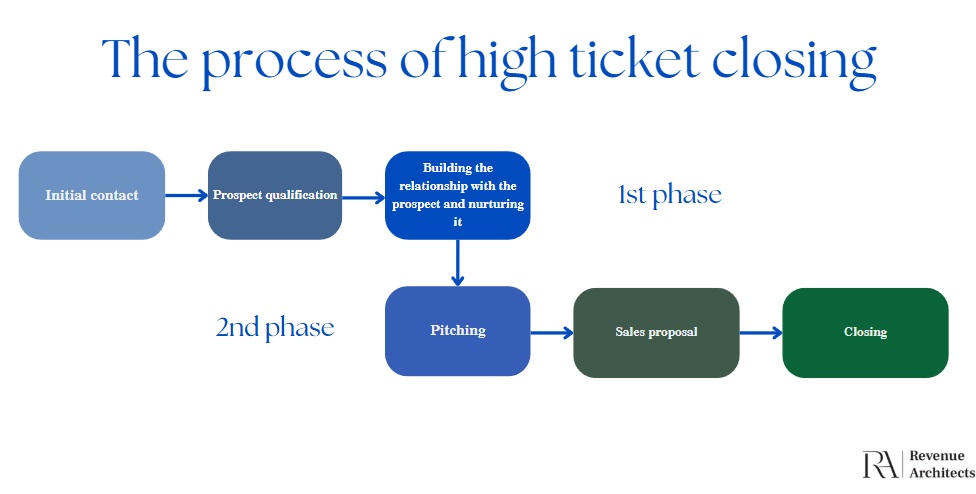What is High-Ticket Closing?
High-ticket closing is a specialized sales strategy focused on closing deals for products or services with high price points, often starting at $5,000 or more. Unlike traditional sales tactics, it emphasizes building trust, demonstrating value, and expertly handling objections.
A high-ticket closer is a professional trained to manage such transactions, ensuring potential clients feel confident in making significant investments. This sales approach often involves a deep understanding of the product and the client’s needs, making it a highly personalized and rewarding process that can inspire and motivate sales professionals.
What is a High-Ticket Closer?
A high-ticket closer is a sales professional who specializes in selling premium products or services to clients. These individuals operate in high-stakes industries, and the products or services require a significant financial commitment from the buyer. Examples of high-ticket sales include real estate, luxury vehicles, advanced coaching programs, and enterprise software solutions.
High-ticket closers excel at creating meaningful conversations with clients, identifying their pain points, and positioning the product as the ideal solution. Their consultative approach sets them apart from traditional salespeople. Their expertise allows them to navigate complex negotiations and close deals effectively, ensuring the client feels valued and supported.

Characteristics of a High-Ticket Closer:
- Confidence and Persuasion: high-ticket closers must exude confidence and possess the ability to influence buyers.
- Empathy: Understanding the client’s emotions and concerns is key to building trust.
- Adaptability: They tailor their approach to fit each client’s unique needs.
- Expertise: They’re knowledgeable about their product and its industry, often becoming specialists in a specific niche.
Reasons to Use High-Ticket Closing
High-ticket closing offers several compelling advantages for businesses and sales professionals. Here are some of the most notable reasons:
1. It’s All About High Quality
High-ticket closing stands out with its unique focus on quality over quantity. Instead of chasing high-volume sales, this approach targets high-value clients. The goal is to provide a premium experience that matches the high price tag of the product or service. By engaging with fewer clients, sales professionals can dedicate more time and energy to understanding their needs and ensuring satisfaction.
2. More Control Over the Sales Process
Clients investing in high-ticket products often have the financial capacity and willingness to make significant purchases. This allows the high-ticket closer to exercise greater control over the sales process, focusing on value demonstration rather than price negotiation. With informed clients, discussions are strategic and solution-oriented, making the process more streamlined and impactful, empowering the high-ticket closer.
3. Higher Earning Potential
Due to the substantial value of their deals, high-ticket closers stand to earn significantly higher commissions. While the sales cycle may be longer and require more effort, the rewards often outweigh the investment of time and energy. This approach represents an opportunity for sales professionals to maximize their earnings while building lasting client relationships.
4. Specialization in a Niche
High-ticket closing often involves selling within a specific niche, requiring the closer to become an expert in their field. This expertise enhances credibility and helps build trust with potential clients. Specialization opens doors to targeted opportunities, whether luxury travel, advanced SaaS solutions, or executive coaching.
What is the Difference Between High-Ticket Closing and Low-Ticket Closing?
The primary distinction between high-ticket closing and low-ticket closing is the value of the deals and the required sales approach.
High-Ticket Closing:
- Focus: High-value products or services (e.g., $5,000+).
- Approach: Consultative, requiring in-depth discussions and relationship building.
- Cycle: Typically longer, as clients need time to evaluate the investment.
- Skills: Deep understanding of the client’s needs and objections.
- Examples: Luxury cars, enterprise software, and exclusive coaching programs.
Low-Ticket Closing:
- Focus: Low-value products or services (e.g., under $500).
- Approach: Volume-driven, often relying on quick decision-making.
- Cycle: Shorter, with less emphasis on personalized interactions.
- Skills: General sales tactics and fast-paced decision-making.
- Examples: Online courses, retail items, or app subscriptions.
While low-ticket closing prioritizes speed and volume, high-ticket closing is about delivering value and forging lasting relationships. Each requires distinct skill sets, but high-ticket closing offers higher rewards in terms of earnings and professional satisfaction.
What Skills Do You Need for High-Ticket Closing?
High-ticket closing demands a refined set of skills beyond traditional sales techniques. Here are the most critical ones:
- Active Listening: Understanding the client’s needs is essential. High-ticket closers must be adept at listening and asking the right questions to uncover the client’s pain points.
- Emotional Intelligence: Empathy and emotional intelligence enable closers to connect with clients more deeply. Recognizing emotions and responding appropriately can build trust and ease the sales process.
- Value-Based Selling: Rather than focusing on price, high-ticket closers highlight the product’s value and benefits. This involves clearly articulating how the product solves a client’s problems or enhances their life.
- Negotiation Skills: high-ticket closers must navigate complex negotiations while maintaining professionalism and confidence. The goal is to address objections and close deals without compromising the product’s value.
- Industry Expertise: Specialization in a specific niche enhances credibility and enables the closer to speaking with authority. This often involves continuous learning and staying updated on industry trends.
How to Become a high-ticket Closer
Becoming a high-ticket closer involves training, practice, and mindset development. Follow these steps to get started:
1. Invest in a high-ticket Closing Course
Enroll in a high-ticket closing course to learn proven techniques from experienced professionals. These courses often cover objection handling, value demonstration, and advanced negotiation strategies.
2. Understand Your Niche
Choose a niche that aligns with your interests and expertise. Research the industry thoroughly and familiarize yourself with the products or services you’ll be selling.
3. Develop Key Skills
Focus on honing the skills mentioned earlier, such as active listening and negotiation. Practice these skills in real-world scenarios to build confidence.
If you need help with improving sales skills, check out our list of courses for upskilling in sales and our books.
4. Ask the Right Questions During Client Conversations
Successful high-ticket closers ask insightful questions to guide the conversation. Examples include:
- What specific challenges are you facing right now?
- How do these challenges impact your business or personal goals?
- What have you tried so far to address these challenges?
- What would a successful outcome look like for you?
- How soon are you looking to implement a solution?
These questions help uncover the client’s pain points and position your product as the ideal solution.
What does the process of high ticket selling look like?

Initial Contact
It all starts with that first hello. Whether it’s a cold email, a LinkedIn message, a referral from a trusted contact, or an inquiry from your website, the initial contact sets the tone. This isn’t the time for hard sales pitches; instead, focus on making a genuine and positive impression. A personalized approach, like mentioning a shared interest or congratulating them on a recent accomplishment, can go a long way in grabbing their attention.
Prospect Qualification
Once you’ve made contact, it’s time to determine whether this potential client is the right fit for your high ticket offering. Not every lead will align with your product’s value or your target audience. By asking thoughtful questions, you can identify whether they have the need, the budget, and the authority to move forward. For example, you might ask about the challenges they’re facing, their timeline for implementing a solution, or who else is involved in the decision-making process. This step ensures that you’re investing your time in the prospects who are most likely to convert.
Building the Relationship
High ticket selling is built on trust, and trust takes time. After qualifying your prospect, the next step is to foster a genuine connection. This stage often involves stepping away from formal sales calls and engaging with them in a more personal way. For instance, you might invite them for a round of golf or organize a casual game night featuring Dungeons & Dragons (yes, even business executives enjoy a bit of role-playing adventure). These moments help build rapport and create a comfortable environment for honest conversations about their needs and goals.
Pitching
Once the relationship is established, it’s time to bring your solution to the table. Your pitch should feel less like a presentation and more like a conversation. Focus on how your product or service addresses the specific challenges they’ve shared with you. Use storytelling to showcase real-world examples of your success, and highlight the unique aspects of your offering that set you apart from competitors. If you’re offering executive coaching, for example, share a story about how a past client transformed their business outcomes through your program. The key is to make it personal and relatable.
Sales Proposal
After delivering your pitch, the next step is to present a detailed proposal. This document reinforces the value you’ve discussed and provides a clear plan for moving forward. Include a summary of their needs, an outline of your solution, transparent pricing, and clear next steps. At this stage, you’re no longer convincing them; you’re collaborating with them to tailor the proposal to their exact requirements. This step helps solidify their confidence in your ability to deliver results.
Closing
The final step is turning that confidence into a commitment. Closing the deal is about guiding the client toward taking action, whether it’s signing a contract or making the first payment. By now, you’ve built trust, addressed their objections, and shown the value of your solution. Use trial closing techniques like asking, “Does this sound like the solution you were looking for?” or create urgency by highlighting limited-time opportunities or the cost of delaying their decision. Keep the process straightforward and positive, making it easy for them to say yes. For example, you might say, “If everything looks good, we can get started as early as tomorrow.”
And what is the remote high-ticket closing?
Remote high-ticket closing has gained a reputation for being highly lucrative and, at times, shady, according to Reddit. It refers to selling premium products or services (typically priced at $2,000 or more) via virtual or remote channels, such as video calls, phone calls, or online chats.

